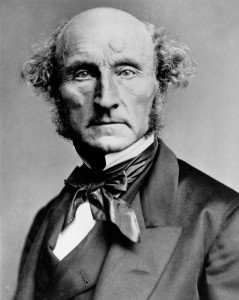Philosopher, economist. Taught ancient Greek and much else by age three by his driving father, James Mill, John Stuart suffered a calamitous nervous breakdown as he approached adulthood. His career remained ambiguous thereafter. On the one hand, many see him as the defender of traditional liberalism, the philosophy of personal liberty, along with free market economics. Others see him as compromising these beliefs in favor of what would prove to be telling encroachments of "big government." He also elaborated, but also in a sense moderated, his father's and Jeremy Bentham's utilitarianism, which weighed moral actions solely in terms of consequences, not some sense of their inner worth, and then consequences, not for individuals, but for the masses of people taken as a whole. This was the opposite of Kant and a curious position for an exponent of personal liberty. Muddied or not, Mill's textbook on economics reigned supreme in both the UK and US for half a century.
